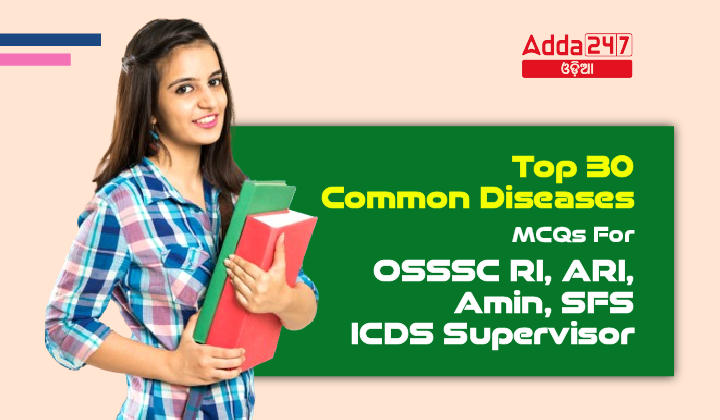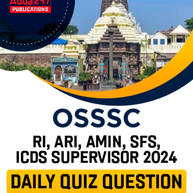Success in the OSSSC ICDS Supervisor examination requires a robust knowledge of health-related topics. To aid your preparation, we’ve compiled a set of 30 Multiple Choice Questions (MCQs) on common diseases. Each question is followed by the correct answer to help you gauge and enhance your understanding of health issues vital to the role of an Integrated Child Development Services (ICDS) Supervisor.
Top 30 Common Diseases MCQs for OSSSC RI, ARI, Amin, SFS, ICDS Supervisor
- What are diseases that spread from one person to another called?
(a) Communicable diseases
(b) Degenerative diseases
(c) Non-communicable diseases
(d) None of the above
Sol: (a) Communicable diseases. - Night blindness is caused due to the deficiencies of which vitamin?
(a) vitamin A
(b) vitamin B
(c) vitamin C
(d) vitamin E
Sol: (a) vitamin A. - Which of the following diseases is an example of non-communicable diseases?
(a) Cancer
(b) Diabetes
(c) Hypertension
(d) All of the above
Sol: (d) All of the above. - What category do Alzheimer’s and osteoporosis fall under?
(a) Communicable diseases
(b) Degenerative diseases
(c) Non-communicable diseases
(d) None of the above
Sol: (b) Degenerative diseases. - Excessive bleeding during an injury is a deficiency of which vitamin?
(a) vitamin A
(b) vitamin B
(c) vitamin K
(d) vitamin E
Sol: (c) vitamin K. - Goitre and the enlarged thyroid gland are mainly diagnosed in patients with deficiencies of which of the following minerals?
(a) Iron
(b) Iodine
(c) Calcium
(d) Phosphorus
Sol: (b) Iodine. - Cystic Fibrosis and Haemophilia are examples of which type of diseases?
(a) Hereditary diseases
(b) Degenerative diseases
(c) Deficiency diseases
(d) None of the above
Sol: (a) Hereditary diseases. - Which of the following diseases is caused by various pathogenic microorganisms?
(a) Deficiency diseases
(b) Hereditary diseases
(c) Infectious diseases
(d) Degenerative diseases
Sol: (c) Infectious diseases. - Which of the following diseases is caused by protein deficiency?
(a) Anaemia
(b) Kwashiorkor
(c) Hypothyroidism
(d) All of the above
Sol: (b) Kwashiorkor. - Which of the following vitamins is also known as ascorbic acid?
(a) vitamin A
(b) vitamin B
(c) vitamin C
(d) vitamin E
Sol: (c) vitamin C. - The deficiency diseases can be prevented by _____________.
(a) Prolonged cooking
(b) Eating only fruits
(c) Eating only vegetables
(d) Eating food with good nutritional value
Sol: (d) Eating food having good nutritional value. - AIDS, common cold, dengue fever and influenza are examples of __________.
(a) Deficiency Disease
(b) Infectious diseases
(c) Physiological Diseases
(d) Non-infectious diseases
Sol: (b) Infectious diseases. - Which of the following vitamins helps in blood clotting?
(a) vitamin A
(b) vitamin C
(c) vitamin D
(d) vitamin K
Sol:(d) vitamin K. - Which of the following vitamins functions as both hormone and visual pigment?
(a) Thiamine
(b) Retinal
(c) Riboflavin
(d) Folic acid
Sol: (b) Retinal. - Which of the following vitamin is also known as niacin and plays a vital role in many digestive tract functions?
(a) vitamin B1
(b) vitamin B2
(c) vitamin B3
(d) vitamin B12
Sol: (c) vitamin B3 - The Deficiency of vitamin E leads to _______
(a) Soft Bones
(b) Bleeding in gums
(c) Weakness in muscles
(d) Neurological disorders
Sol: (c) Weakness in muscles. - Xerophthalmia caused due to the deficiency of ___________.
(a) vitamin A
(b) vitamin B
(c) vitamin C
(d) vitamin E
Sol: (a) vitamin A. - Which of the following is not an infectious disease?
(a) Dengue
(b) Scurvy
(c) Typhoid Fever
(d) Whooping cough
Sol: (b) Scurvy. - Which of the following is the main cause of blindness in children worldwide?
(a) Glaucoma
(b) Cataracts
(c) Protein deficiency
(d) vitamin A deficiency
Sol: (d) vitamin A deficiency - Amoxicillin, Doxycycline Azithromycin, and Penicillin are some examples of ________.
(a) Bacteria
(b) Pathogens
(c) Antibiotics
(d) Vaccinations
Sol: (c) Antibiotics. - Which of the following diseases is only found in African-Americans?
a) Sickle cell Anaemia
b) Filariasis
c) Trypanosomiasis
d) Haemophilia
Ans. c) Trypanosomiasis - Who is known as the Father of Medicine?
a) Aristotle
b) Hippocrates
c) Antoni van Leeuwenhoek
d) Antoine Lavoisier
Ans. b) Hippocrates - Which of the following non-infectious diseases is the most lethal?
a) Cancer
b) Diabetes
c) AIDS
d) Obesity
Ans. a) Cancer - Which of the following is not a pathogenic biological agent?
a) Fungi
b) Radiations
c) Virus
d) Mycoplasma
Ans. b) Radiations - Which of the following does not qualify as a degenerative disease?
a) Atherosclerosis
b) Obesity
c) Hypertension
d) Alzheimer’s disease
Ans. b) Obesity - What pathogen is responsible for Pneumonia disease?
a) Haemophilus influenzae
b) Salmonella typhi
c) Myxovirus influenzae
d) Bordetella pertussis
Ans. a) Haemophilus influenzae - Which age group is most usually affected by diphtheria?
a) Above 10 years
b) Below 5 years
c) Adults
d) Above 60 years
Ans. b) Below 5 years. - A drug called ‘Smack’ is obtained by which of the following?
a) Leaves of Cannabis Sativa
b) Fruits of Erythroxylum coca
c) Flowers of Datura
d) Latex of papaver somniferum
Ans. d) Latex of papaver somniferum - Which of the following is the name of the combination vaccine given to children to protect them against Tetanus, Whooping Cough, and Diphtheria?
a) BCG Vaccine
b) DPT Vaccine
c) HIB Vaccine
d) TAB Vaccine
Ans. b) DPT vaccine - Which of the following statements about Typhoid disease is false?
a) Typhoid is caused by Mycobacterium leprae
b) Infection occurs through contaminated food and water
c) Symptoms include high fever, weakness, constipation, and loss of appetite.
d) Severe cases may result in intestinal perforation and death.
Ans. a) Typhoid is caused by Mycobacterium leprae





